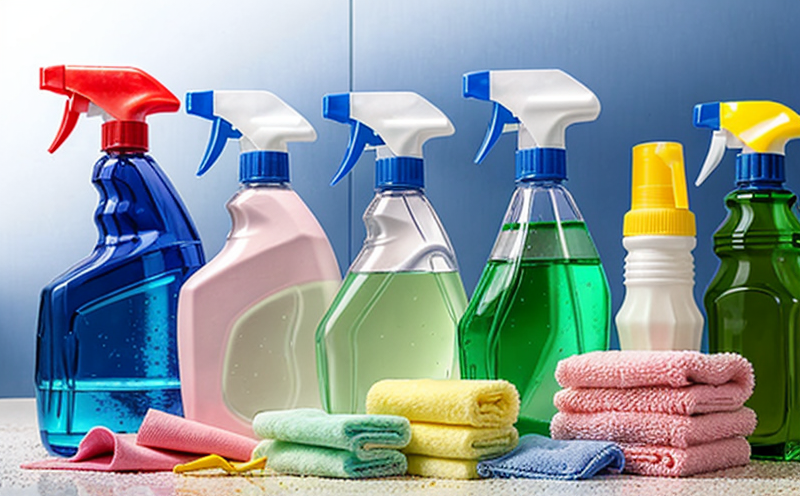Sensitization Testing of Cleaning Products
The sensitization testing of cleaning products is a critical procedure designed to evaluate and quantify the potential allergenicity of chemical substances used in these products. This test assesses whether individuals could experience adverse skin reactions, such as eczema or contact dermatitis, due to prolonged exposure or direct contact with the product.
Consumer safety remains paramount in today’s market, where an increasing number of consumers are sensitive to various chemicals. By conducting sensitization testing, manufacturers can ensure compliance with international standards and regulations while also safeguarding their brand reputation and consumer trust. This service is particularly important for cleaning products that come into direct contact with human skin, such as soaps, detergents, and disinfectants.
The test involves exposing a specific type of skin cell line to the active ingredients or formulations of the cleaning product under controlled conditions. The exposure duration varies depending on the product’s intended use, but it is typically conducted over several days to weeks, allowing sufficient time for any allergic reactions to develop. Following this period, the cells are analyzed using various techniques such as ELISA (Enzyme-Linked Immunosorbent Assay) or flow cytometry to measure the level of IgE antibodies produced by the immune system.
Understanding sensitization testing requires a basic knowledge of how our skin interacts with chemicals. The skin is an important barrier against external substances, but it can also be affected by allergens present in cleaning products. When exposed to these allergens, the body’s immune system may overreact, leading to inflammation and discomfort. This test helps identify which components of the product could trigger such reactions.
For instance, certain fragrances or preservatives are known for their ability to cause sensitization. By identifying these potential triggers early in development, manufacturers can reformulate products to minimize risks while maintaining efficacy. Additionally, this testing ensures that cleaning products comply with regulatory requirements set by organizations like the European Union’s REACH (Registration, Evaluation, Authorization and Restriction of Chemicals) framework.
The sensitization test is not only beneficial for consumer safety but also plays a crucial role in enhancing product quality. It allows companies to improve their formulations based on scientific evidence rather than relying solely on anecdotal reports or customer complaints. Furthermore, this service helps reduce the likelihood of recalls and lawsuits associated with harmful products.
In summary, sensitization testing is an essential step in ensuring that cleaning products are safe for widespread use by sensitive individuals. By incorporating this test into their quality control processes, manufacturers can demonstrate their commitment to consumer safety and regulatory compliance, ultimately building stronger brands and fostering trust among customers.
Eurolab Advantages
At Eurolab, we offer comprehensive sensitization testing services tailored specifically for cleaning products. Our team of experts uses state-of-the-art equipment and follows internationally recognized standards to provide accurate results that meet global regulatory requirements. Here are some key advantages our clients enjoy:
- Accurate Results: Utilizing advanced analytical methods ensures precise measurement of allergenic potential.
- Compliance with Standards: Our tests adhere to relevant international standards such as ISO 10993-14 and EN 868, ensuring your product meets necessary safety criteria.
- Expertise and Experience: Our specialists possess extensive experience in performing various types of sensitization tests across multiple industries.
- Confidentiality: We respect client confidentiality by handling sensitive information securely throughout the testing process.
- Custom Solutions: Whether you need basic or complex analyses, our flexible approach allows us to design bespoke solutions that align with your specific needs.
- Timely Delivery: Efficient project management practices ensure timely completion of tests without compromising quality.
- Comprehensive Reporting: Detailed reports accompany every test result, providing clear insights into the allergenic properties of your product.
Why Choose This Test
Sensitization testing is crucial for several reasons. Firstly, it helps identify potential allergens in cleaning products early on during development stages, enabling manufacturers to make informed decisions about ingredient selection and formulation adjustments. Secondly, this test ensures compliance with regulatory requirements imposed by various countries worldwide, including the EU’s REACH regulations.
Another important aspect is protecting consumer health and safety. By identifying allergenic components through sensitization testing, companies can prevent unnecessary exposure to harmful substances, thereby reducing the risk of adverse reactions among users. This proactive approach contributes significantly towards maintaining public trust in cleaning products.
Additionally, performing this test demonstrates a company’s commitment to responsible manufacturing practices and sustainable development goals. It shows that they are committed not only to producing high-quality products but also to promoting environmental stewardship by minimizing the use of harmful chemicals wherever possible.
In conclusion, choosing sensitization testing for cleaning products is essential for ensuring product safety, regulatory compliance, consumer protection, and responsible manufacturing practices—all critical factors in today’s competitive market environment. With Eurolab’s expertise behind your tests, you can rest assured that your products will meet the highest standards of quality and reliability.
Environmental and Sustainability Contributions
Sensitization testing contributes positively to environmental sustainability by promoting responsible use of resources within manufacturing processes. By identifying potential allergens early in development, companies can avoid unnecessary waste associated with product recalls or reformulations resulting from adverse reactions post-launch.
The identification of harmful allergenic substances also encourages the development of eco-friendly alternatives that are less likely to cause sensitization issues. This shift towards more sustainable formulations not only benefits human health but also supports broader environmental goals by reducing pollution and promoting resource efficiency.
Furthermore, adhering to strict regulatory standards like ISO 10993-14 ensures that all cleaning products undergo rigorous evaluation before being released onto the market. This commitment enhances overall product quality while fostering trust among consumers who value both safety and sustainability.
Incorporating sensitization testing into your R&D workflow allows for continuous improvement in terms of ingredient selection, formulation optimization, and process refinement—all key elements contributing to long-term environmental impact reduction. By embracing these practices, companies play a vital role in advancing the cause of sustainable development globally.





